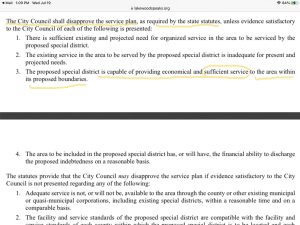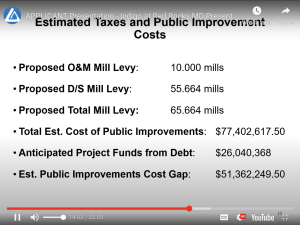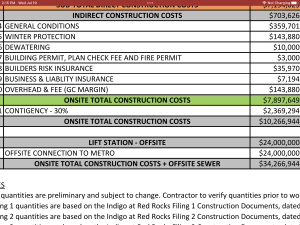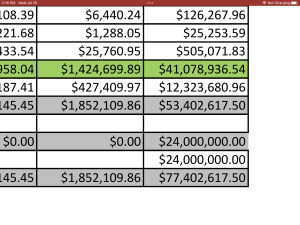Here are three positions regarding the proposed new Cardel Metro District. Representative Taggart from Mesa County, Green Mountain Water and Sanitation Board and a citizen.
Green Mountain Water and Sanitation District, which values transparency has commented on one important aspect of the proposed Service Plan – the lack of sanitation from an appropriate source – and Cardel’s misrepresentation that Green Mountain is one of the anticipated sources of sanitation service.
” We object to being named as the possible service provider for any new district.” (Excerpt from letter linked here:)
This is important because as the Lakewood staff report shows, the Service Plan application “shall” be denied if the district cannot provide “sufficient service within its boundaries”.

By its own terms, the service plan cannot provide an essential service – sanitation. They’re still working on it. So, until they get sewer service, their application “shall” be denied under CRS 32-1-203(2). They can always come back when they’re ready.
Here is the Service Plan’s reference to no sewer:
” It is anticipated that sanitary sewer service to the property within the District will be provided either by Metro Water Recovery (formally known as the Metro Wastewater Reclamation District) (“Metro”) or Green Mountain Water & Sanitation District (“Green Mountain”) pursuant to one or more intergovernmental agreements among them, however the final means and parameters of such service have not been finalized as of the date of this Service Plan.”
“The City will not approve any Approved Development Plan unless and until sanitary sewer service to the property within the District is obtained.”
(p. 6)
A citizen who recently retired from the Green Mountain Water and Sanitation District also commented. Here is the “Lakewood Speaks” site with the public comment.
Note that there is also the staff presentation, applicant presentation and staff report. Unfortunately they do not address the metro district abuses and issues raised in the prior blog.
Here is Lakewood Speaks with the public comment:
https://lakewoodspeaks.org/items/3104
Excerpt from the citizen and former Green Mountain board member:
“The arguments that such debt is needed are patently misleading – the developer could simply roll the cost of any infrastructure and other amenities into the cost of the homes to be sold, instead of saddling the future resident with millions of interest payments, while proclaiming that this is “affordable” housing.”
“The proposed Metro District is outside the GM’s boundaries. There is no agreement to provide any service. Not only that, but in several of the last elections, the constituents of GMWSD made it clear, in no uncertain terms, that the District SHALL NOT provide any extraterritorial service, full stop.”
Here is the detailed evaluation of the abuses in the Service Plan:
Cardel Homes Metro District Application – Indigo in Rooney Valley
And the concluding summary of abuses and defects from the report above:
“Here is why it should be denied. The proposed Service Plan contains several metro district abuses which
- will create significant debt
- on unsuspecting residents and
- eliminates any control by those residents over whether or not they enter into that debt.
In particular,
- There is no prohibition on the developer voting to approve a ballot issue to eliminate the residents’ right to vote on issuing bond debt and increasing taxes
- There is no prohibition on the developer voting to approve a ballot issue to increase the authorized debt limit higher than the debt limit approved in the Service Plan
- The Service Plan authorizes up to 18% interest on debt
- There is no limit on the amount of fees the developer can impose on the residents for operations and maintenance.
- There is no limit on the amount of the mill rate (taxes) that can be imposed by the developer on the residents to pay for operations and maintenance
- The Service Plan allows unlimited mill rates for debt service
- The term of 40 years for debt is too long. The standard is 30 years.
- There is no provision for notice to the residents that the developer has a conflict of interest with the residents regarding taxing and spending of residential money (taxed by and paid for the developer), the developer employees only serve on the district boards because residents have not self-nominated to be appointed or elected, here is the form and where to send it to be appointed or elected to the board.
- Creating a metro district before Cardel has sewer for the site is premature
- Cardel has failed to show how the income from sale of the developed lots won’t cover the cost of the land, cost of the infrastructure and at least 30% profit to Cardel
-
- Cardel has the burden under the statute to prove there is a need – that they won’t cover their costs and profit by selling the developed lots
-
- This application for a Service Plan approval and creation of a new government fails to meet that burden”
And, finally, apparently we hear from Representative Taggart from Mesa County who, apparently, was recruited by Cardel to lobby the City Council in favor of the new metro district – based on the fact that HE got a bill passed with “transparency” provisions that will assure no more metro district abuse.
Lets first consider Representative Taggart and his colleagues in the state legislature who have worked very hard to preserve the abuses by actually making them law.
First, here is one of Representative Taggart’s colleagues, Representative Bockenfeld, opposing a bill this year to stop metro district abuse explaining that victims of metro district abuse and disenfranchised taxpayers are whiners.
Then, here is Representative Taggart testifying during a hearing on his “transparency” bill, that the transparency part is worthless. He asserts that if you take out section 4 – which legalizes developers with a conflict of interest buying their own debt paid by the residents – if you take out that section 4, you gut the bill. The actual “so called” transparency sections are worthless.
(The only “important” part of his bill is the Trojan horse section buried in the “so called” transparency provisions. That section legalizes developers with a conflict of interest voting to issue themselves bonds which they will hold collecting the principal and interest which residents will pay – without any knowledge or agreement by the residents.)
And Representative Taggart was right. The “so called” transparency provisions of his bill are in fact worthless. Here they are:
- set a max mill levy in the service plan – this is already done. Solterra’s service plan from 2006 had this as do all other service plans
- set a max debt limit in the service plan – this is already done. Solterra’s service plan from 2006 had this as do all other service plans.
- have an annual meeting to review metro district issues – so when residents raise metro district issues during the year they will now be instructed to come back and ask those questions at the annual (once a year) meeting.
- give new homeowners the website for the metro district – don’t give them the critical documents which won’t be on the website – make them think they are getting information when in fact most of the key documents will still be withheld.
Here is the full “Act”: http://leg.colorado.gov/sites/default/files/2023a_110_signed.pdf
And, unfortunately, Representative Taggart, like many of his colleagues, don’t “get it”. Metro districts don’t “FRONT” the money for pipes in the ground and golf course or tennis courts. Metro districts are there to PAY BACK the money developers already have and then spend to put the pipes in the ground. NOT to get the money up front.
Think about it. The money to pay back the developer for the pipes in the ground comes from the residents. Either when they buy their house (traditional way) or pay their metro district taxes (Colorado way). (And oftentimes they pay both and twice for the pipes in the ground.) There is no “up front” money from the residents until the residents get there. After the money is already spent. So the developer has to get the money “up front” and they do. From a bank, from their own capital or from a group of investors.
Here are two of the industry spokespersons – one lawyer and one bond expert explaining the REAL reason for issuing the bond debt as soon as possible is to do it before the residents take their rightful seats on their governing boards (the developers only sit in those seats because “no residents wanted to run or be appointed”).
Because, once the residents get a vote, they may not agree that they actually owe the money once they demand a non-developer audit of how the money was spent. Until the residents arrive, the developer agrees with himself on behalf of the residents how much money (and interest) he will pay to himself. And then give the debt to the residents. “Allowing” the people who will actually pay that debt to have a say – checks and balances – is inconvenient for the developer.
ITS A RACE TO SEE HOW MUCH DEBT THE DEVELOPER CAN LOCK THE RESIDENTS INTO BEFOE THE RESIDENTS GET CONTROL OF THE BOARD AND HAVE A VOTE.
Since the residents can’t be trusted to pay their share of the infrastructure costs after they move in, the developers have a right to keep the residents off the residents’ own metro district board UNTIL the developer can lock the residents into as much debt as the developer wants to collect.
Otherwise, “it’s a massive risk”.
Representative Taggart was right about one thing though – the city has a lot of power to oversee the financial integrity of the district until the residents take their rightful seats on their own governing board. Including, making approval conditional on city approval of any debt issued against the residents until the residents arrive.
Oversight by the City is particularly important when the developer is playing games with the numbers.
Compare the breakdown of expenses in the financial plan with the presentation for Monday. Here is from the presentation for Monday:

Above, the developer’s presentation shows the cost of public improvements at $77 million. But as shown below, that includes a 30% “contingency fee” ($12 million) and the cost of building Big Sky’s sanitation uplift station ($24 million) which is not part of Cardel’s development or even in its district.
And it says the debt will be $26 million. But the service plan says the debt will be $42.5million. There is no reference in the Service Plan or attached financial plan to $26 million.
Below are the numbers from the actual financial plan in the service plan application:



So, in fact, the cost of the pipes in the ground is $41 million not $77 million and the debt limit under the service plan is $42.5 million, at least until the developer votes to increase that limit in the “TABOR election” and eliminate the right of future residents to vote on taxes and debt with 1 – 8 “voters” (developer, employees and family members).
There is no “cost gap” between the cost of the pipes in the ground ($41 million) and the debt that will be issued ($42.5million) except the developer will pay himself $1.5 million more than what it cost (which $41 million already includes his profit). It appears from Cardel’s own numbers that the 30% “contingency fee” and cost for building Big Sky’s lift station inappropriately inflate the infrastructure cost figure from $41 million up to $77 million.
This kind of gamesmanship cries out for oversight and the residents won’t get it from the developer.
- Ultimately oversight doesn’t exist until the residents have 100% of the seats on the board.
- Good government mandates that no debt on the residents issue until they get there and approve it themselves.
The Cardel metro district application will be decided July 24 at the City Council meeting.
Ward 4 is discussing it tomorrow night at 7.
